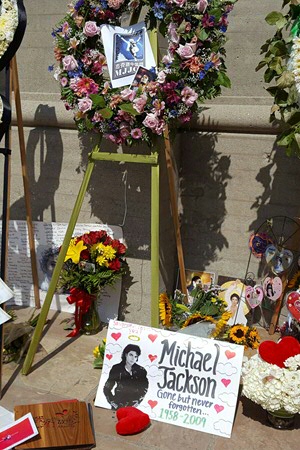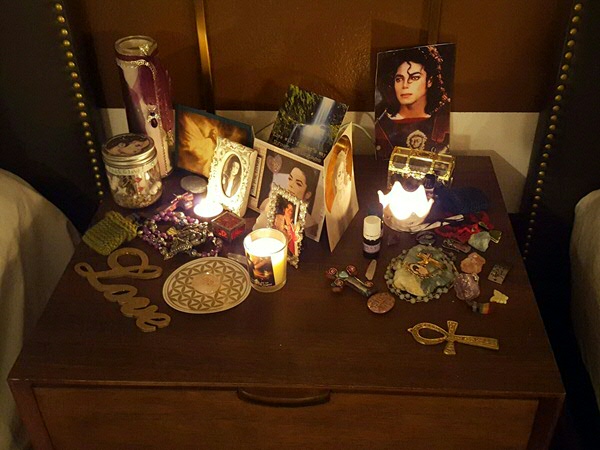Michael Jackson-fans geven vorm aan betekenisvol leven via hun idool

Michael Jacksons dood in 2009 zorgde wereldwijd voor verdriet. Nog steeds bestaan er herdenkingspraktijken ter nagedachtenis van de popster, zoals een virtueel maandelijks gebed en een jaarlijkse pelgrimage. Religiewetenschapper Fardo Eringa onderzocht voor haar promotie deze gebruiken en de impact die de popster heeft op de levensovertuiging van zijn volgers. Zij concludeert dat Jackson-pelgrims doelbewust putten uit hun ‘fandom’ voor het vormgeven van hun wereldbeeld en om uiting te geven aan hun activistische, idealistische karakter.
Michael Jackson stierf onverwacht op 25 juni 2009. In de nasleep van zijn dood organiseerden fans herdenkingspraktijken ter nagedachtenis van The King of Pop om hun toewijding te uiten en hun verlies een plek te geven. Fans noemen dit ‘Michaeling’. Eringa heeft de volgers van Jackson bestudeerd als een voorbeeld hoe populaire cultuur bepaalde rituelen kan voortbrengen die leidend en vormend zijn voor een betekenisvol, moreel leven.
Lichtend voorbeeld
Centraal in het onderzoek staan 26 volwassen vrouwen van boven de 45 die zichzelf hebben gecommitteerd aan Jackson als morele gids voor hun dagelijks leven. Geïnspireerd door zijn leven en muziek pogen zij zichzelf en de wereld om hen heen te verbeteren. Eringa: ‘De fans gebruiken Jacksons muziek om hun emoties en moreel kompas te sturen en om hun spiritualiteit te ervaren. Zij gebruiken hun fan-zijn bewust voor het vormgeven van hun wereldbeeld en ter cultivatie van een activistische inborst.’
Keerpunt
Waarom heeft Eringa alleen met oudere vrouwen gesproken? ‘Sowieso is dat een grote bepalende meerderheid binnen de beweging. Het zijn geen vrouwen in een midflifecrisis, maar wel mensen die op een punt in hun leven zijn dat ze iets willen veranderen, of dat ze terugblikken. Vaak zijn ze met Jacksons muziek opgegroeid en hebben ze de leeftijd die hij had toen hij overleed. Dat leidt tot reflectie: wat heb ík tot nu toe gedaan?’ Als de beweging wordt gedragen door mensen van middelbare leeftijd bestaat het gevaar dat deze op termijn uitdooft. Speelt dat? ‘Nee, de aantallen bezoekers op evenementen zijn misschien zelfs wel groter geworden, via alle oproepen op sociale media. Aan de andere kant: ik hoorde ook wel dat het lastiger is om bijvoorbeeld vrijwilligers en organisatoren te vinden.’

Michaeling
Eringa onderzocht en nam deel aan drie uitingen van Michaeling, zoals een herdenkplek in München, waar fans een standbeeld van Orlando Di Lasso hebben getransformeerd in een Jackson-heiligdom, en het online maandelijkse gebed ‘the Major Love Prayer’. Deelnemers daaraan worden aangespoord om de boodschap van Jackson te internaliseren en te verspreiden door middel van meditatie op zijn muziek. Tijdens de jaarlijkse ‘Michael Week’ in Los Angeles, gaan fans als pelgrims naar Michael-plekken.
Zeldzame filantropische toewijding
De fans gebruiken de pelgrimage als ritueel voor hun individuele groei in het hier en nu. ‘Maar ze gebruiken Michaeling ook om Jacksons filantropische werk voort te zetten en om dichterbij elkaar te komen. Dit onderstreept dat een diepgewortelde wens tot verbinding en politiek engagement ten grondslag liggen aan de fans hun wereldbeeld en fandom.’ In de geest van Jackson willen de fans goed voor de aarde zorgen: klimaatverandering, daklozen en dierenwelzijn kunnen op grote belangstelling rekenen. ‘Ze willen een goed mens zijn en verder gaan waar hij is gestopt. De langdurige activistische toewijding om geld in te zamelen en bewustwording te creëren voor specifieke doeleinden, zonder de directe prikkel van een beroemdheid, is zeldzaam binnen fandom.’
Richtingenstrijd
Een lieflijke, harmonieuze wereld, zo klinkt het. Maar in elke eredienst willen vroeg of laat sommigen hogepriester zijn. Ook binnen Michaeling, waar geen officiële organisatie achter zit, is er weleens sprake van richtingenstrijd en streven naar macht. ‘In Duitsland was er bijvoorbeeld onenigheid over welke groep een standbeeld kon beheren en daar activiteiten kon organiseren. Zo’n positie geeft toch status. Je krijgt respect en dank van fans. En misschien ziet Jackson wel wat je voor hem doet.’

Gelaagdheid
Dit onderzoek is een vervolg op het onderzoek dat Eringa voor haar masterscriptie deed naar Michaeling. Wat betekende deze verdieping? ‘Mijn scriptie heb ik geschreven op basis van e-mailinterviews. Nu ben ik er echt in gedoken, met veldwerk en gesprekken. Ik denk dat ik nu de gelaagdheid beter doorzie. Destijds noemde ik het een nieuwe religie. Nu zie ik dat het meer zo is dat fans hun eigen levensverhaal vervlechten met dat van Michael. Ze vormen een beeld van hem dat past bij hun eigen levenswandel en interpretatie van het geloof.’
Geen pamflet ter verdediging
Eringa is zelf ook Jackson-fan. Wat betekende dat voor haar onderzoek? ‘Als ik geen fan was was dit onderzoek niet mogelijk geweest. Het gaf een ingang. Als je alleen kritisch bent sluiten de fans zich af. Ik vond het leuk om me hierin onder te dompelen en na te denken over de diepere lagen in zijn muziek en leven. Ik wist bijvoorbeeld niet dat hij ook gedichten had geschreven. Hij intrigeert me, maar hij is geen idool. Die spirituele connectie voel ik niet en ik heb ook niet de neiging hem te verdedigen.’ Sommige fans hoopten dat ze een pamflet zou schrijven dat Jacksons onschuld bewijst in de beschuldigingen van seksueel misbruik. Maar daar gaat dit onderzoek niet over. ‘Ik ben bang dat sommigen straks wel een beetje teleurgesteld zullen zijn. Maar boos, dat niet. Ze zijn fanatiek, maar staan ook open voor andere visies.’
Meer weten?
Eringa promoveert op 7 oktober. Zij kan helaas niet eerder dan 11 oktober eventueel geïnteresseerden te woord staan.
Meer nieuws
-
06 januari 2026
Geschiedenis dichterbij brengen
-
10 juni 2025
RUG en Rijksmuseum tekenen samenwerkingsovereenkomst
